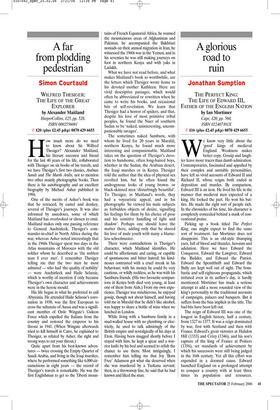A far from plodding pedestrian
Simon Courtauld
WILFRED THESIGER: THE LIFE OF THE GREAT EXPLORER by Alexander Maitland HarperCollins, ┬Ż25, pp. 528, ISBN 0002556081 Ō£å ┬Ż20 (plus ┬Ż2.45 p&p) 0870 429 6655 How much more do we need to know about Sir Wilfred Thesiger? Alexander Maitland, his literary executor and friend for the last 40 years of his life, collaborated with Thesiger on six books of his travels, and we have ThesigerŌĆÖs first two classics, Arabian Sands and The Marsh Arabs, not to mention two other mainly photographic books. Then there is his autobiography and an excellent biography by Michael Asher published in 1994.
One of the merits of AsherŌĆÖs book was that he retraced, by camel and donkey, several of ThesigerŌĆÖs journeys. It was also informed by anecdotes, some of which Maitland has overlooked or chosen to omit. Maitland makes only one passing reference to General Auchinleck, ThesigerŌĆÖs commander-in-chief in North Africa during the war, whereas Asher noted interestingly that in the 1960s Thesiger spent two days in the Atlas mountains of Morocco with the old soldier whom he described as ŌĆśthe noblest man I ever metŌĆÖ. I remember Thesiger telling me that the two men he most admired ŌĆö who had ŌĆśthe quality of nobilityŌĆÖ ŌĆö were Auchinleck and Haile Selassie, which is worthy of mention if only because ThesigerŌĆÖs own character and achievements were in the heroic mould.
His life began in what he preferred to call Abyssinia. He attended Haile SelassieŌĆÖs coronation in 1930, was the first European to cross the sultanate of Aussa and was a significant member of Orde WingateŌĆÖs Gideon Force which expelled the Italians from the country and restored the emperor to his throne in 1941. (When Wingate afterwards tried to kill himself in Cairo, he explained to Thesiger, as related by Asher, the right and wrong ways to cut your throat.) Quite apart from his best-known adventures ŌĆö twice crossing the Empty Quarter of Saudi Arabia, and living in the Iraqi marshes, where he performed something like 6,000 circumcisions in eight years ŌĆö the record of ThesigerŌĆÖs travels is remarkable. He was the first Englishman to get to the Tibesti moun tains of French Equatorial Africa, he roamed the mountainous areas of Afghanistan and Pakistan, he accompanied the Bakhtiari nomads on their annual migration in Iran, he witnessed the 1960s war in the Yemen, and in his seventies he was still making journeys on foot in northern Kenya and with yaks in Ladakh.
What we have not read before, and what makes MaitlandŌĆÖs book so worthwhile, are the letters which Thesiger wrote home to his devoted mother Kathleen. Here are vivid descriptive passages, which would often be abbreviated or rewritten when he came to write his books, and occasional bits of self-revelation. We learn that Thesiger had a horror of spiders, and that, despite his love of most primitive tribal peoples, he found the Nuer of southern Sudan to be ŌĆśnaked, uninteresting, uncompanionable savagesŌĆÖ.
The sometimes naked Samburu, with whom he lived for 20 years in Maralal, northern Kenya, he found much more interesting and companionable. Maitland takes on the question of ThesigerŌĆÖs devotion to handsome, often long-haired boys, whether in the Sudan, the Arabian desert, the Iraqi marshes or in Kenya. Thesiger told the author that the idea of physical sex revolted him, but he often found the androgynous looks of young brownor black-skinned men ŌĆśdisturbingly beautifulŌĆÖ. To Thesiger, in MaitlandŌĆÖs words, they had a voyeuristic appeal, and in his photographs ŌĆśhe viewed his male subjects as forbidden objects of desire, signalling his feelings for them by his choice of pose and his sensitive handling of light and shadowŌĆÖ. Perhaps one should leave the matter there, adding only that he shared his love of male youth with many a blameless schoolmaster.
There were contradictions in ThesigerŌĆÖs character, which Maitland identifies. He could be affectionate and caring, or capable of spontaneous and bitter hatred; his kindnesses contrasted with a cruel streak in his behaviour; with his money he could be very cautious, or wildly reckless, as he was with his Samburu friends. (His two favourite companions in Kenya both died very young, at least one of them from Aids.) From my own experience, Thesiger was mischievous, he enjoyed gossip, though not about himself, and having told me in Maralal that he didnŌĆÖt like alcohol, was happy to share a bottle of wine when we lunched in London.
While living with a Samburu family in a mud-walled house with no plumbing or electricity, he used to talk admiringly of the British empire and nostalgically of his days at Eton. Having been mugged shortly before I stayed with him, he kept a spear and a warrior knife by his bed and seemed to relish the chance to use them. Most intriguingly, I remember him telling me that Joy ŌĆśBorn FreeŌĆÖ Adamson got what she deserved when she was murdered by a Turkana servant; then, in a throwaway line, he said that he had known and liked the man.


































































 Previous page
Previous page